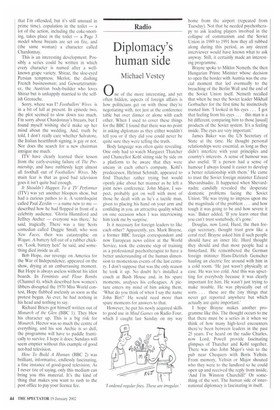Diplomacy's human side
Michael Vestey
One of the more interesting, and yet often hidden, aspects of foreign affairs is how politicians get on with those they're negotiating with, not just at the conference table but over dinner or alone with each other. When I used to cover these things for the BBC I found that there was no point in asking diplomats as they either wouldn't tell you or if they did you could never be quite sure they were telling the truth.
Body language was often quite revealing. One only had to watch Margaret Thatcher and Chancellor Kohl sitting side by side on a platform to be aware that they were uneasy in each other's company. Kohl's predecessor, Helmut Schmidt, appeared to find Thatcher rather trying but would openly joke about her manner as he left a joint news conference. John Major, I suspect, probably got on well with most of those he dealt with as he's a tactile man, given to placing his hand on your arm and confiding in you, an attractive quality which on one occasion when I was interviewing him took me by surprise.
Is it necessary for foreign leaders to like each other? Apparently, yes. Mark Brayne, a former BBC foreign correspondent and now European news editor at the World Service, took the extreme step of training as a professional psychotherapist to have a better understanding of the human dimension to momentous events of the last century. I don't suppose that was the only reason he took it up. No doubt he's installed a couch at Bush House and, in his spare moments, analyses his colleagues. A picture enters my mind of him asking them, 'What do you think of when I say the name John Birt?' He would need more than spare moments for answers to that.
However, he put his newly acquired skills to good use in Mind Games on Radio Four, which I caught last Sunday on my way home from the airport (repeated from Tuesday). Not that he needed psychotherapy to ask leading players involved in the collapse of communism and the Soviet Union in 1989 to 1991 how they all rubbed along during this period, as any decent interviewer would have known what to ask anyway. Still, it certainly made an interesting programme.
Brayne spoke to Miklos Nemeth, the then Hungarian Prime Minister whose decision to open the border with Austria was the crucial moment that led eventually to the breaching of the Berlin Wall and the end of the Soviet Union itself. Nemeth recalled that when he met the Soviet leader Mikhail Gorbachev for the first time he instinctively trusted him. 'I looked in his eyes . .. I got that feeling from his eyes . .. this man is a bit different, comparing him to those [usual] products of the Soviet system. It's a feeling inside. The eyes are very important.'
James Baker was the US Secretary of State at the time. He thought personal relationships were essential, as long as they didn't interfere with your principles and country's interests. A sense of humour was also useful. 'If a person had a sense of humour I always found it easier to develop a better relationship with them.' He came to trust the Soviet foreign minister Eduard Shevardnadze. It happened when Shevardnadze candidly revealed the desperate domestic problems facing the Soviet Union. 'He was trying to impress upon me the magnitude of the problem . . . and how tough it was going to be and how severe it was.' Baker added, 'If you learn once that you can't trust somebody, it's gone.'
Douglas, now Lord, Hurd, the then foreign secretary, thought trust grew like a coral reef. Brayne asked him if such people should have an inner life. Hurd thought they should and that most people had a hinterland. He remembered the German foreign minister Hans-Dietrich Genscher hauling an electric fire around with him in a cold room. 'He just wasn't physically at ease. He was too cold. And this was upsetting for everybody because it was clearly important for him. He wasn't just trying to make trouble. He was physically out of sorts . . these are the tiny things that never get reported anywhere but which actually are quite important.'
I hope Brayne makes another programme like this. The thought occurs to me that there must be a series in it when we think of how many high-level encounters there've been between leaders in the past 25 years. I've heard on the radio Charles, now Lord, Powell provide fascinating glimpses of Thatcher and Kohl together. There was also John Major's visit to the pub near Chequers with Boris Yeltsin. From memory, Yeltsin or Major shouted who they were to the landlord so he could open up and received the reply from inside, 'And I'm Winston Churchill!' Or something of the sort. The human side of international diplomacy is fascinating in itself,






























































 Previous page
Previous page